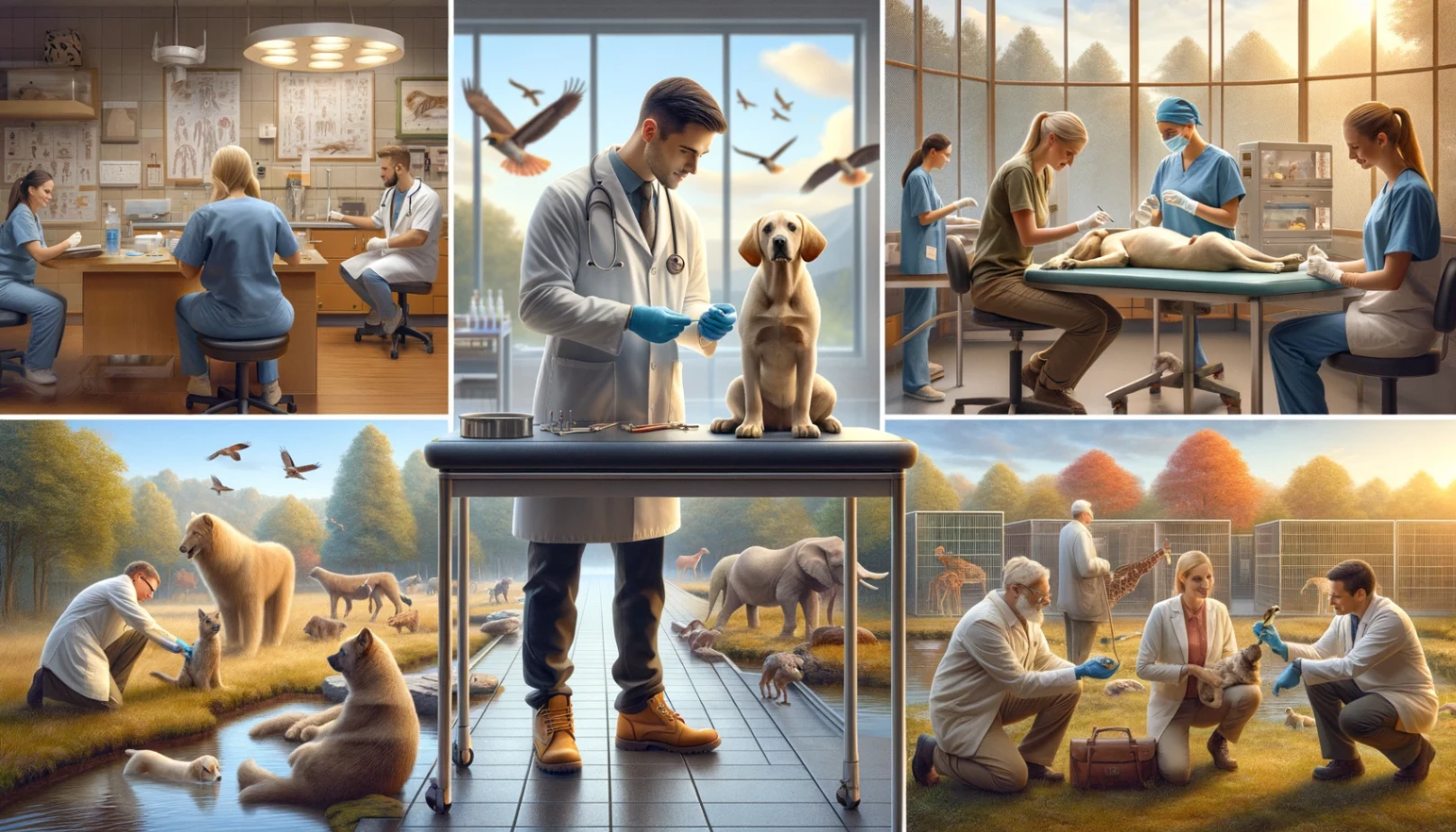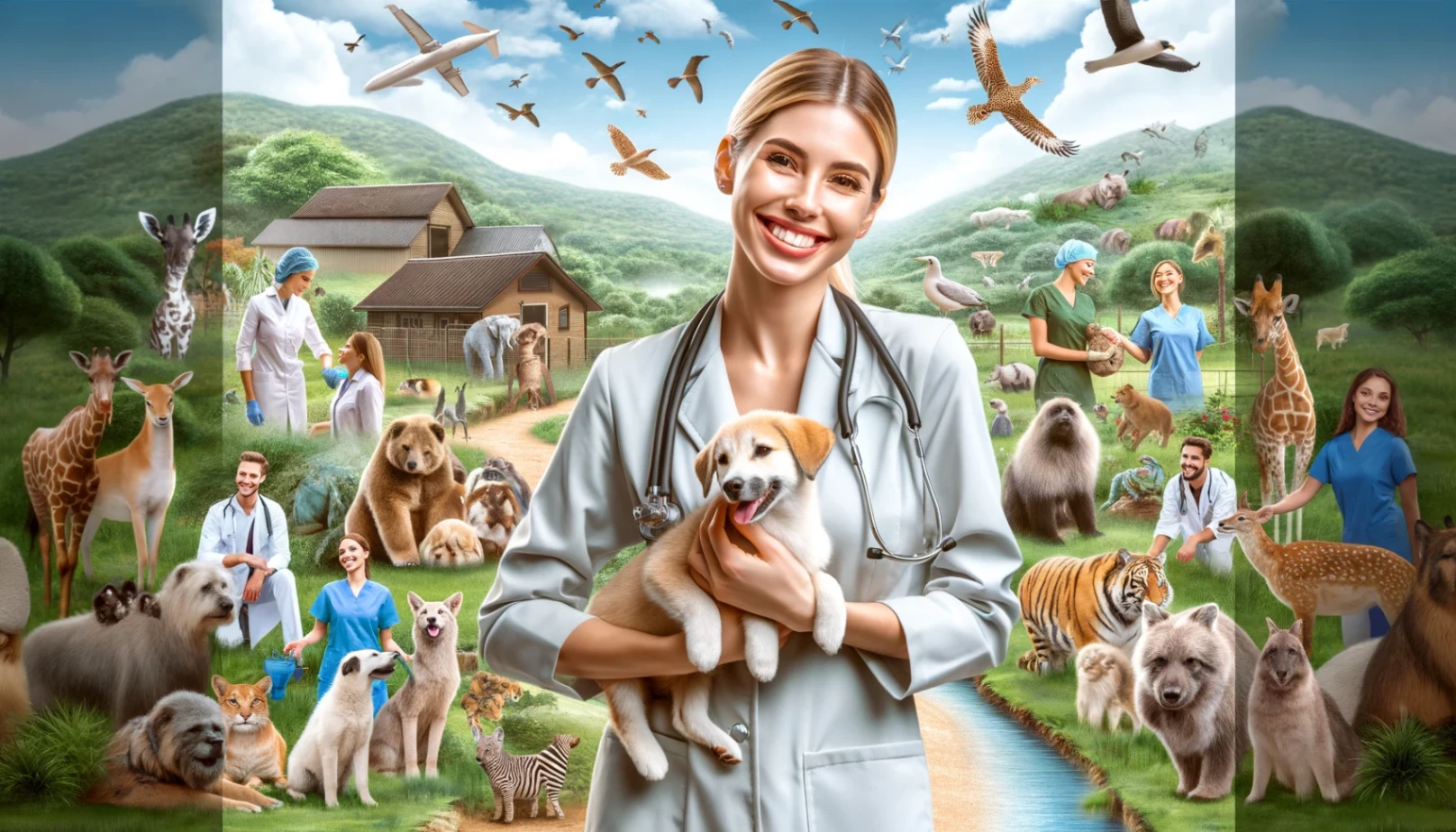Explore diverse animal care careers, from veterinary to wildlife rehabilitation, offering flexible full-time and part-time options.
Learn about their importance, career paths, and salaries here. Animal care offers fulfillment and compassion, whether you’re starting fresh or seeking change.
The Importance of Animal Care Jobs
Animal care jobs play a vital role in safeguarding the well-being of our furry companions and wildlife.
Here are vital reasons highlighting their importance:
- Ensuring Health and Well-Being: Animal care professionals oversee the health, vaccinations, and treatment of animals, ensuring their overall well-being.
- Rescue and Rehabilitation: They rescue and rehabilitate injured, abandoned, or abused animals, giving them a second chance.
- Preventing Cruelty: They identify and avoid animal cruelty, ensuring kindness and respect in animal treatment.
- Disease Control: Animal care workers help control disease spread by vaccinating and monitoring animals.
- Conservation: Wildlife rehabilitators and conservationists protect and preserve endangered species, maintaining ecosystem balance.
- Education: They educate the public about responsible pet ownership, animal behavior, and conservation efforts.
- Supporting Research: Animal care professionals assist research by providing insights into animal behavior, physiology, and health.
- Companionship: They provide companionship and comfort to shelter animals, improving their quality of life while awaiting adoption.
These roles collectively create a world where animals are cared for with compassion.

Types of Animal Care Jobs
Animal care jobs encompass a wide range of roles, each contributing to the well-being of animals. Here are some key types of animal care jobs:
Veterinary Assistants and Technicians
Veterinary Assistants and Technicians play vital roles by aiding veterinarians with procedures, animal care, and facility maintenance.
They contribute significantly to the well-being of many animals, from pets to livestock.
Responsibilities
- Assisting with animal examinations.
- Administering medications and treatments.
- Performing laboratory tests and diagnostics.
- Preparing surgical equipment and assisting in surgeries.
- Educating pet owners on animal care.
- Maintaining cleanliness in clinic or hospital areas.
Education and Training Requirements
Veterinary Assistants:
- Typically require a high school diploma or GED.
- On-the-job training and experience are often sufficient.
- Certification or formal training programs are optional but can be advantageous.
Veterinary Technicians:
- Usually need an associate degree in veterinary technology.
- Completion of accredited veterinary technology programs is common.
- State licensure or certification may be required in some regions.
- Continuing education to maintain knowledge and skills is important.
Expected Salary Range:
- Veterinary Assistants: $25,000 to $35,000 per year.
- Veterinary Technicians: $35,000 to $50,000 per year.
These figures can fluctuate based on factors such as geographic location and the type of facility (e.g., private clinic, research institution, or emergency hospital).
Animal Shelter Workers
Animal Shelter Workers are dedicated professionals who work in shelters and rescue centers.
They play a pivotal role in caring for animals and facilitating their adoption into loving homes.
Roles and Responsibilities
- Providing daily care, including feeding, grooming, and ensuring the well-being of shelter animals.
- They are matching animals with potential adopters and facilitating the adoption process.
- We are conducting health checks, administering medications, and coordinating veterinary care.
- It is ensuring clean and sanitary living conditions within the shelter.
- We are educating the public on responsible pet ownership and promoting adoption as a humane choice.
Importance of Shelter Work
- Saves and improves the lives of animals through adoption
- Raises awareness for humane treatment
- Strengthens communities by reducing strays and promoting safety
Expected Salary Range
Salaries for Animal Shelter Workers can vary based on experience and location. Here are the expected salary ranges:
- Entry-level Positions: $20,000 to $30,000 per year.
- Experienced Workers: $30,000 to $40,000 per year.
Pet Groomers
Pet groomers are experts in maintaining pet hygiene and appearance, enhancing pet well-being, and strengthening human-animal bonds.
- Washing pets to remove dirt and odors
- Removing tangles and mats from the fur
- Trimming and shaping fur based on breed standards or owner preferences
- Clipping or filing nails to a safe length
- Cleaning and checking ears for signs of infection
- Brushing teeth to maintain oral health
- Identifying skin issues or abnormalities
Certification and Training
- Pet Grooming Certification: Completing a formal grooming certification program.
- On-the-Job Training: Gaining experience working with experienced groomers.
- Apprenticeships: Learning under the guidance of a master groomer.
- Continuing Education: Attending workshops and seminars to stay updated.
- Safety and Handling Certification: Obtaining certification in safe pet handling practices.
Expected Salary Range
Expected salaries for Pet Groomers vary based on location, experience, and workplace type. Here are the salary ranges:
- Entry-level Pet Groomers: $20,000 to $30,000 per year.
- Experienced Pet Groomers: $30,000 to $50,000 per year.
Wildlife Rehabilitation Specialists
Wildlife Rehabilitation Specialists care for and rehabilitate injured or orphaned wild animals, aiming to release them back into their natural habitats.
Their work contributes to wildlife conservation and biodiversity preservation.
Expected Salary Range
Wildlife Rehabilitation Specialists’ salaries vary based on location, experience, and organization size.
Here are the expected salary ranges for this profession:
- Entry-level Wildlife Rehabilitation Specialists: $25,000 to $35,000 per year.
- Experienced Wildlife Rehabilitation Specialists: $35,000 to $50,000 per year.

Career Growth and Opportunities
Wildlife Rehabilitation Specialists can find diverse career growth opportunities with potential advancements and specialized roles.
Here are avenues for career development and opportunities in this profession:
- Specialization: Specialists can focus on specific species or habitats.
- Supervisory Roles: Advancement to management positions is possible.
- Research and Education: Opportunities exist in research and advocacy.
- Consulting and Conservation: Roles in wildlife consulting and conservation initiatives are available.
- Government Positions: Some may work with state or federal wildlife agencies.
Also read: CareerBuilder Job Search App: Download and Start Your Job Search Today
How to Pursue a Career in Animal Care
Pursuing a career in animal care requires dedication and a love for animals. Here are steps to help you embark on this fulfilling journey:
- Education: Start with a high school diploma or equivalent.
- Research: Explore various animal care careers to find your passion.
- Formal Training: Consider relevant certificate or degree programs.
- Volunteer: Gain hands-on experience by volunteering at shelters or clinics.
- Internships: Seek internships or externships for practical skills.
- Certification: Obtain necessary certifications for specific roles.
- Networking: Connect with professionals and organizations in the field.
- Job Search: Look for openings at animal hospitals, shelters, or zoos.
- Continued Learning: Stay updated with industry developments and trends.
- Passion: Dedication and a genuine love for animals are crucial to success.
Summing It Up
In conclusion, the animal care field provides a range of opportunities, from full-time to part-time roles, for those dedicated to enhancing the lives of animals.
Whether you’re starting a new career or considering a change, it offers a fulfilling path to explore and positively impact the well-being of animals.











